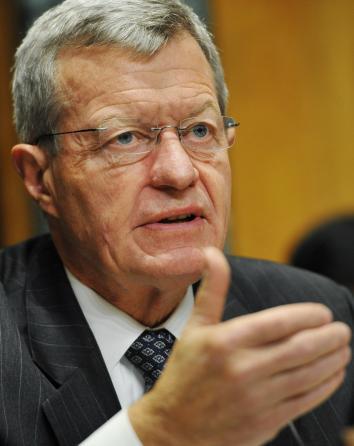It seems wrong to hate something that you’ve never read. Yet the Trans-Pacific Partnership, a globally significant free trade agreement being worked out in secret, is rewriting the rules in more ways than one.
The TPP is already being negotiated behind closed doors, but the situation could get worse. Late on Thursday afternoon, House Ways and Means Chairman Dave Camp, R-Mich., Senate Finance Committee Chairman Max Baucus, D-Mont., and Sen. Orrin Hatch, R-Utah, introduced the Bipartisan Congressional Trade Priorities Act of 2014. The bill would grant the White House fast-track authority, sometimes known as the “trade promotion authority,” to ratify trade deals.
If the bill passes, it would allow agreements like TPP to be ratified by a straight up-and-down vote, with no amendments allowed from the floor, and lawmakers would have to forgo procedural stalling tactics like the filibuster. That’s a great deal of oversight power for Congress to abdicate over a deal that not many people have even read.
Apart from a few corporations, most stakeholders and public interest groups have been unable to read the TPP drafts in full. Even those in government have complained that their staff cannot access the negotiating text. As Wisconsin Democrat Mark Pocan* said in reponse to the new bill: “Blindly approving or disapproving agreements that have largely been negotiated in secret would represent a derelict of duty for Congress. If there is nothing to hide in these agreements, we should be allowed to debate and amend these deals in the open.”
The introduction of fast-track authority is of particular concern for technology companies, digital rights groups, and even public health advocates, who are all concerned about the treaty’s copyright and patent provisions. Leaked versions of the TPP indicate that it moves negotiating countries toward stricter and extended intellectual property laws—for instance, greater criminalization of copyright breaches and regulations that might force Internet service providers to censor content.
When introducing the bill, the three U.S. lawmakers said in a statement: “The TPA [trade promotion authority] legislation we are introducing today will make sure that these trade deals get done, and get done right.” They argued that the fast-track authority would support a robust trade agenda that would benefit American workers and exports.
The good news? The New York Times reports that it’s not likely the bill will be passed. One hundred fifty-one Democrats have signed a letter indicating their opposition, and Tea Party Republicans are unlikely to vote for it, given their inability to grant President Obama anything resembling a victory.
Yet if Congress does abdicate its right to oversight, there are fears that the TPP will never be subject to proper scrutiny. This could rubberstamp a free-trade agreement that has the potential to seriously curtail Internet freedom and hurt the nascent digital economy.
*Correction, Jan. 13, 2014: This blog post originally and incorrectly refered to Rep. Mark Pocan as a Republican. He is a Democrat.
